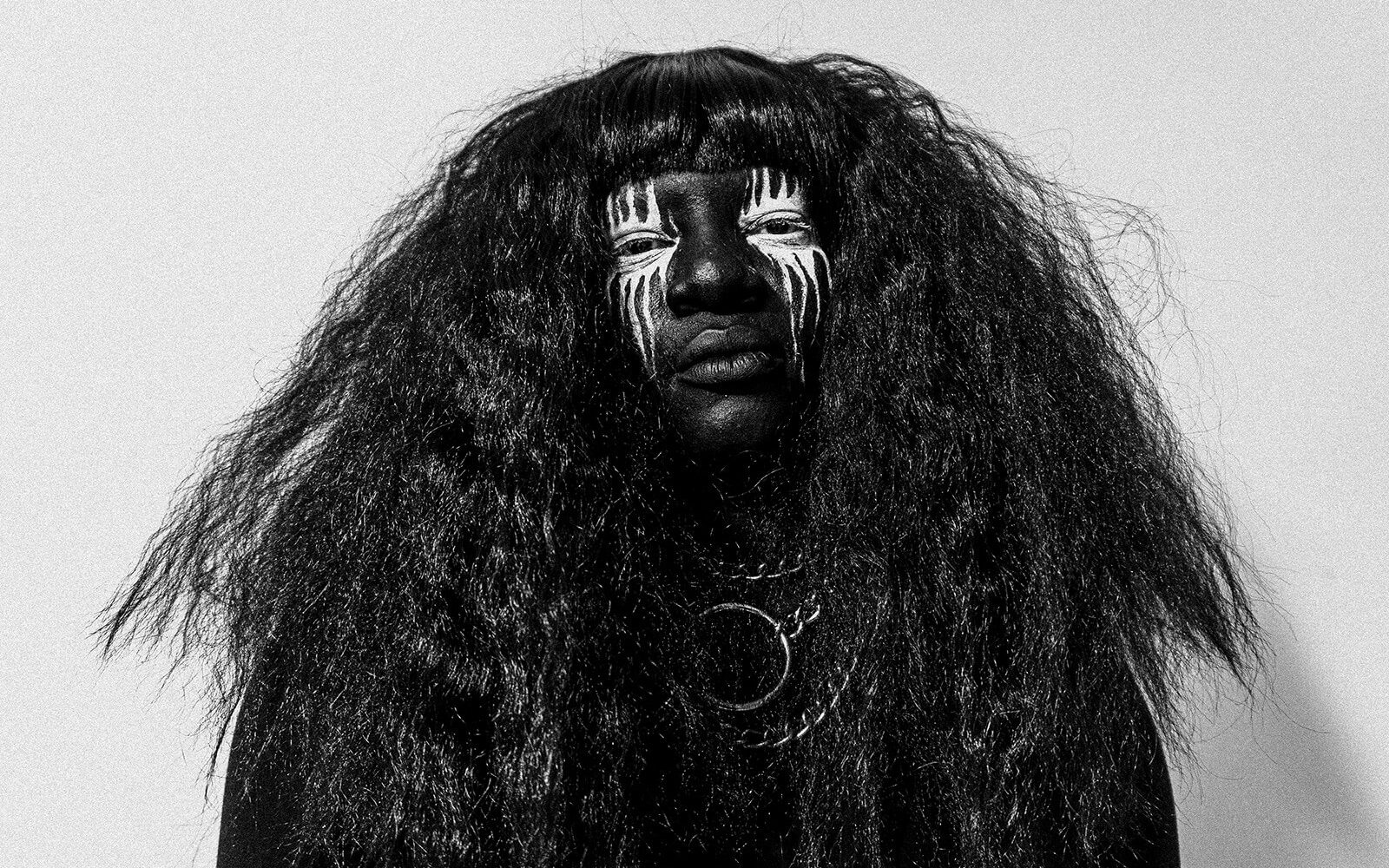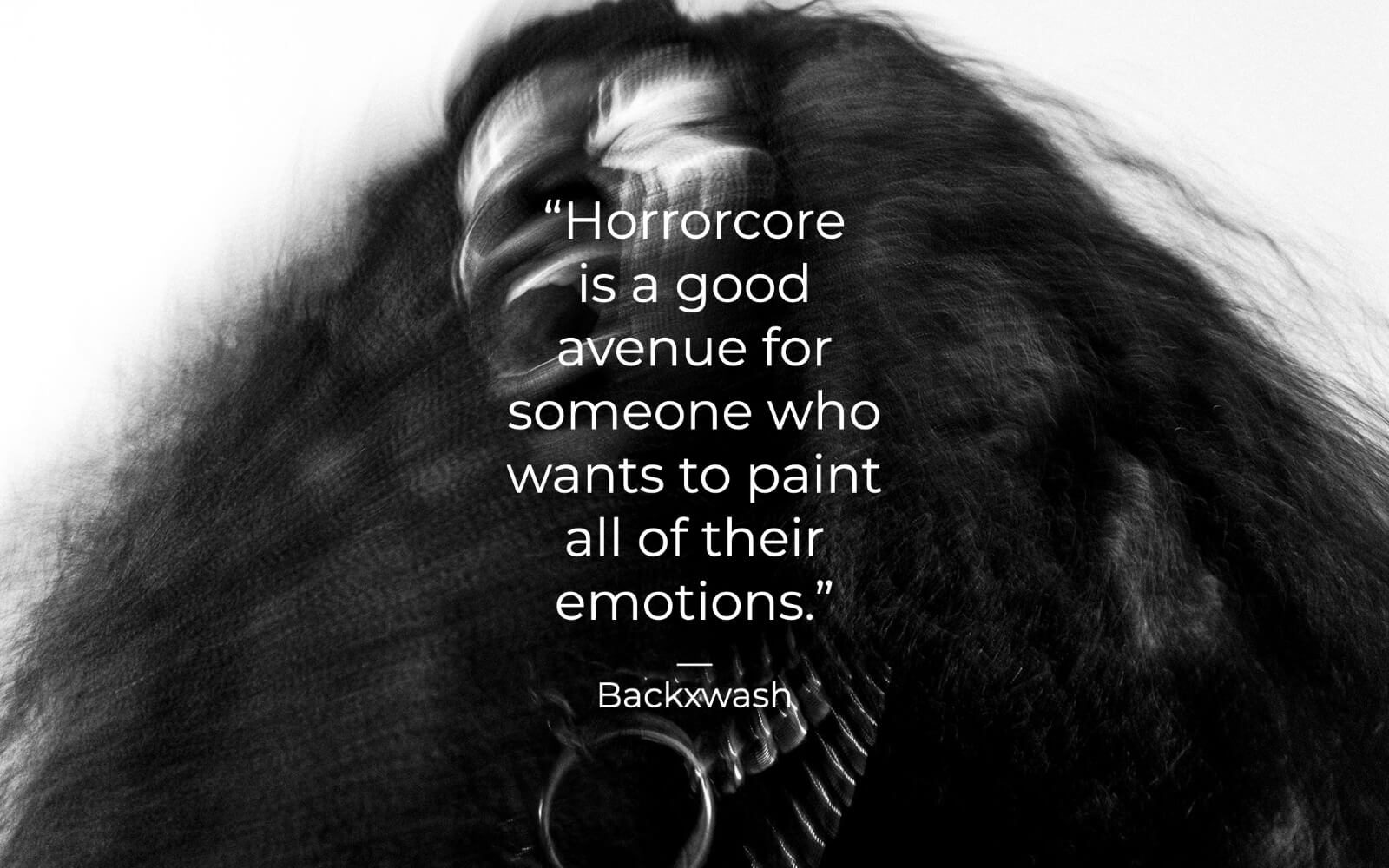By Cam Delisle
In the wake of her breakthrough third album, Through The Wall, the experimental-R&B auteur reflects on a career-defining year.

Ashanti Mutinta is sitting in her Montreal home, putting the finishing touches on the penultimate track of her upcoming album, I Lie Here Buried with My Rings and My Dresses. The rapper, producer, and self-described anarchist better known as Backxwash is audibly tired but clearly excited as she inches closer to completion on what is poised to be her breakout album.
Blending swaggering flows inspired by 90s East Coast rap with grinding metal guitars and twisted horrorcore lyrics that punch up with the same fervour as a Jordan Peele film, Mutinta has crafted a fully loaded album, building on the momentum of her Polaris Music Prize winning debut, God Has Nothing To Do With This Leave Him Out Of It. A coveted award given annually to the best Canadian album based on artistic merit, Backxwash joins a list of heavyweights that has recently included artists like Kaytranada, Lido Pimienta, and Haviah Mighty.
As a transgender woman, she has been battling for respect and inclusion in the Canadian hip-hop scene for years, but her injection of female energy into the traditionally male-dominated space of horrorcore paired with her vivid, cathartically angry depictions of her experiences are starting to resonate with a wider audience. “Horrorcore is a good avenue for someone who wants to paint all of their emotions,” Mutinta says. “Just like how horror in movies is used to freely express difficult subjects, that also stands true from a musical standpoint.”
Mutinta was drawn to the crossroads of hip-hop and metal because of the rebellious and revolutionary connotations attached to both genres, as well as the general lack of rules attached to their sound. She stands among a long list of transgender artists leading the charge on boundlessly experimental music, many in the similarly chaotic, in-your-face and genre-free space of hyperpop. “I think we just gravitate towards experimental genres,” she says with enthusiasm. “I think it’s the idea of rebellion as well. Just how punk it is to participate in those genres with no rules, doing whatever you want.”
On I Lie Here Buried…, she uses that artistic freedom to lay the smackdown on racism and bigotry across centuries of history. From the lasting colonial ramifications of the African slave trade to modern-day microaggressions, Mutinta leaves no transgression unchecked. On album highlight, “666 in Luxaxa,” she dives into the reclamation of the word “witchcraft,” a derogatory term given to African spiritual practices by European missionaries, over a flipped sample of African choral music used in traditional healing. “I put the sample there as a connection to the Zulu people, how they’re able to make sure that their values are not lost in colonization and stay true to their traditions,” she says.
Today, Mutinta is proud to be a witch and she reflects it through her ghoulish and dark aesthetic, often accompanied by elaborate makeup and costuming. She spent her childhood and teenage years in a highly religious community in Zambia before moving to British Columbia for a university degree. And like many others in the LGBT community, now feels more comfortable on the more devilish side of things after being verbally kicked out of god’s graces one too many times.
“It mostly has to do with embracing identity. If I’m not embraced by one side, I might as well embrace the side that doesn’t have a problem with me,” she says. “Freedom of expression in terms of the visuals and symbols you can use to express yourself is a very strong thing.”
Mutinta credits the musical diversity and spirit of collaboration she experienced growing up in Africa with her love of creation and her penchant for unconventional sounds.“There’s a lot of hip-hop from Zambia that I grew up making with people around the neighbourhood, and there’s also the music in the churches combining African instruments with all of these choral passages,” she says. “I’m still influenced by that, and sometimes it’s like, ‘Yo, I should put a spin on this.’”
If the way Mutinta cuts vocally into every syllable, making sure the listener feels the impact of her every word, reminds you of the dead-eyed, murderous conviction of early Jay-Z or Biggie, it’s no accident. Lighting up with excitement and talking a mile a minute as soon as the subject is brought up, Mutinta could go on for hours about her love of old school hip-hop, sampling, and battle rap—especially out of New York City.

“Back in the day when you hear that somebody is a New York rapper… if you’re in a cypher, people would be terrified! They’d be like, ‘Oh, you’re from New York? I know you’re about to really, really rap,’” she says.“My first experience was with “Mo Money Mo Problems.” Growing up listening to Method Man and Prodigy. I was obsessed with Big L at one point; being a fan of syllable play and different pockets to rhyme in, that’s usually where I’m coming from. It’s had a huge influence on the way I write my raps for sure.”
Although singing the praises of legendary sampling wizards like J Dilla, DJ Toomp, and Kanye West – who she calls “a very difficult person to listen to, but one of my all-time favourites” while laughing – Mutinta’s number one sample flip doesn’t come from hip-hop at all. “It would have to be the Britney Spears ‘Toxic’ joint,” she says. “That was just fucking raw.” For the uninitiated, Spears’ timeless instrumental comes from a Bollywood track played in reverse.
Although Mutinta wasn’t able to actually get into the studio with her collaborators due to the pandemic, it didn’t change much about her approach. She spent most of her early career sending out songs to others, grateful for any response in the form of a stray guitar riff or feature verse to add on. Now, she’s accompanied by fellow transgender and non-binary rising stars such as Black Dresses and Censored Dialogue, as well as metal outfit Code Orange and horrorcore titans, clipping. “Whatever they added, I’m going to put it in because that’s their expression,” she says. “We don’t give each other advice; I don’t change it. Everybody who’s been featured on this album completely brought it.”
Mutinta is especially appreciative of the support she has been shown from Black communities because she wants to shatter the stereotypical perception that they wouldn’t typically be into her metal influence. “Most of the non-supportiveness is actually from the metal side,” she says. “They can be very elitist about hip-hop being integrated with metal. They say ‘Ice-T did it first.’ I’m not trying to be Ice-T. He’s extremely dope, but I’m not trying to be like him.”
At the request of her fans, Mutinta made an effort to make her songs longer for her upcoming project, many now stretching past four minutes, but she confesses that things were likely heading in that direction regardless – simply because the current state of the world has given her much to say.
As if ripped from the pages of Salem’s treacherous history books wherein accused witchcraft provocateur Giles Corey was famously quoted screaming for “More Weight” as he was pressed to death one crushing slab of concrete at a time, I Lie Here Buried opens with the sound of drowning, something Mutinta says correlates to the emotional weight being piled on her each day. Whether it’s a news story popping up on her feed or simply glancing in the mirror the wrong way and experiencing gender dysphoria, she inevitably feels the crushing weight of the world bearing down on her. Of course, the intentionally weighty sample also functions as another homage to classic hip-hop albums when samples were a definitive rite of passage. “The idea with the drowning was introducing people to the themes of the album, like ‘this is what you’re in for,’” she says. “I look at it like, you know when 50 Cent started off Get Rich or Die Tryin’ with the actual 50 cent coin dropping on the table? It’s just a way to get introduced to the project.”
As a well-researched student of the rap game equipped with decades of musical knowledge, trust Mutinta to always find the best combination of aspects pulled from diverse musical worlds to best express herself while speaking her truth.
I Lie Here Buried with My Rings and My Dresses will be released on June 20.
By Cam Delisle
In the wake of her breakthrough third album, Through The Wall, the experimental-R&B auteur reflects on a career-defining year.
By John Divney
Still processing their debut album, Vancouver’s latest art-rock unit proves collaboration is the new rebellion.
By Cam Delisle
The elusive Kevin Parker soundtracks the self-medicated search for bliss on his fifth album, Deadbeat.